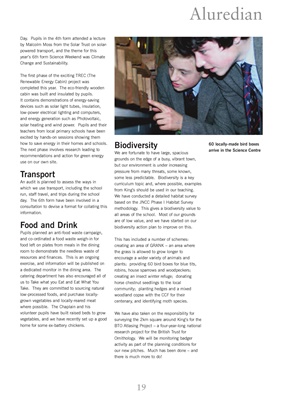
Day. Pupils in the 4th form attended a lecture
by Malcolm Moss from the Solar Trust on solarpowered
transport, and the theme for this
year's 6th form Science Weekend was Climate
Change and Sustainability.
The first phase of the exciting TREC (The
Renewable Energy Cabin) project was
completed this year. The eco-friendly wooden
cabin was built and insulated by pupils.
It contains demonstrations of energy-saving
devices such as solar light tubes, insulation,
low-power electrical lighting and computers,
and energy generation such as Photovoltaic,
solar heating and wind power. Pupils and their
teachers from local primary schools have been
excited by hands-on sessions showing them
how to save energy in their homes and schools.
The next phase involves research leading to
recommendations and action for green energy
use on our own site.
Transport
An audit is planned to assess the ways in
which we use transport, including the school
run, staff travel, and trips during the school
day. The 6th form have been involved in a
consultation to devise a format for collating this
information.
Food and Drink
Pupils planned an anti-food waste campaign,
and co-ordinated a food waste weigh-in for
food left on plates from meals in the dining
room to demonstrate the needless waste of
resources and finances. This is an ongoing
exercise, and information will be published on
a dedicated monitor in the dining area. The
catering department has also encouraged all of
us to Take what you Eat and Eat What You
Take. They are committed to sourcing natural
low-processed foods, and purchase locallygrown
vegetables and locally-reared meat
where possible. The Chaplain and his
volunteer pupils have built raised beds to grow
vegetables, and we have recently set up a good
home for some ex-battery chickens.
Biodiversity
We are fortunate to have large, spacious
grounds on the edge of a busy, vibrant town,
but our environment is under increasing
pressure from many threats, some known,
some less predictable. Biodiversity is a key
curriculum topic and, where possible, examples
from King's should be used in our teaching.
We have conducted a detailed habitat survey
based on the JNCC Phase I Habitat Survey
methodology. This gives a biodiversity value to
all areas of the school. Most of our grounds
are of low value, and we have started on our
biodiversity action plan to improve on this.
This has included a number of schemes:
creating an area of GRANK - an area where
the grass is allowed to grow longer to
encourage a wider variety of animals and
plants; providing 60 bird boxes for blue tits,
robins, house sparrows and woodpeckers;
creating an insect winter refuge; donating
horse chestnut seedlings to the local
community; planting hedges and a mixed
woodland copse with the CCF for their
centenary, and identifying moth species.
We have also taken on the responsibility for
surveying the 2km square around King's for the
BTO Atlasing Project - a four-year-long national
research project for the British Trust for
Ornithology. We will be monitoring badger
activity as part of the planning conditions for
our new pitches. Much has been done - and
there is much more to do!
Aluredian
19
60 locally-made bird boxes
arrive in the Science Centre